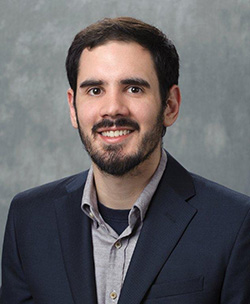Boor receives NSF Career Award

Brandon Boor, assistant professor in the Lyles School of Civil Engineering, has been nationally recognized as a rising star in engineering research and education.
In February, Boor received a 2019 National Science Foundation CAREER award. The award supports junior faculty members who exemplify the role of teacher-scholars through research, education, and the integration of education and research within the context of the mission of their organization. The award comes with a five-year (2019-24), $500,000 grant for research and education activities.
Specifically, NSF cites Boor's research into the formation, growth and phase-state of organic nanoaerosols in indoor environments.
According to the NSF grant, air pollution from outdoor sources is well-recognized as a potential health risk, but it is also essential to improve air quality in homes and offices because Americans spend 90% of their time indoors.
"Human exposure to particles in air pollution is responsible for adverse health effects," the grant summary states. "An important class of indoor particles is nanoaerosols — particles smaller than 100 nanometers in size. New research is needed to better understand the fate and transport of nanoaerosols in buildings to better predict human exposure."
Boor says a major component of his research is dedicated to learning what exactly happens to these indoor particles: how they form and grow, where they deposit and how their properties change. He studies the life cycle of a particle, including where it ends up — be it on a surface, in a human body or vented outside.
"When it comes to indoor air quality there is so much we don't know," Boor says. "There are tremendous research opportunities when you consider that the vast majority of the air we breathe is indoor air."
As part of the NSF CAREER award, Boor will create an educational component to engage and excite undergraduate and graduate students at Purdue through a combination of service, experiential and team-based learning experiences.
The $500,000 CAREER grant will help fund Boor's research through 2024.
